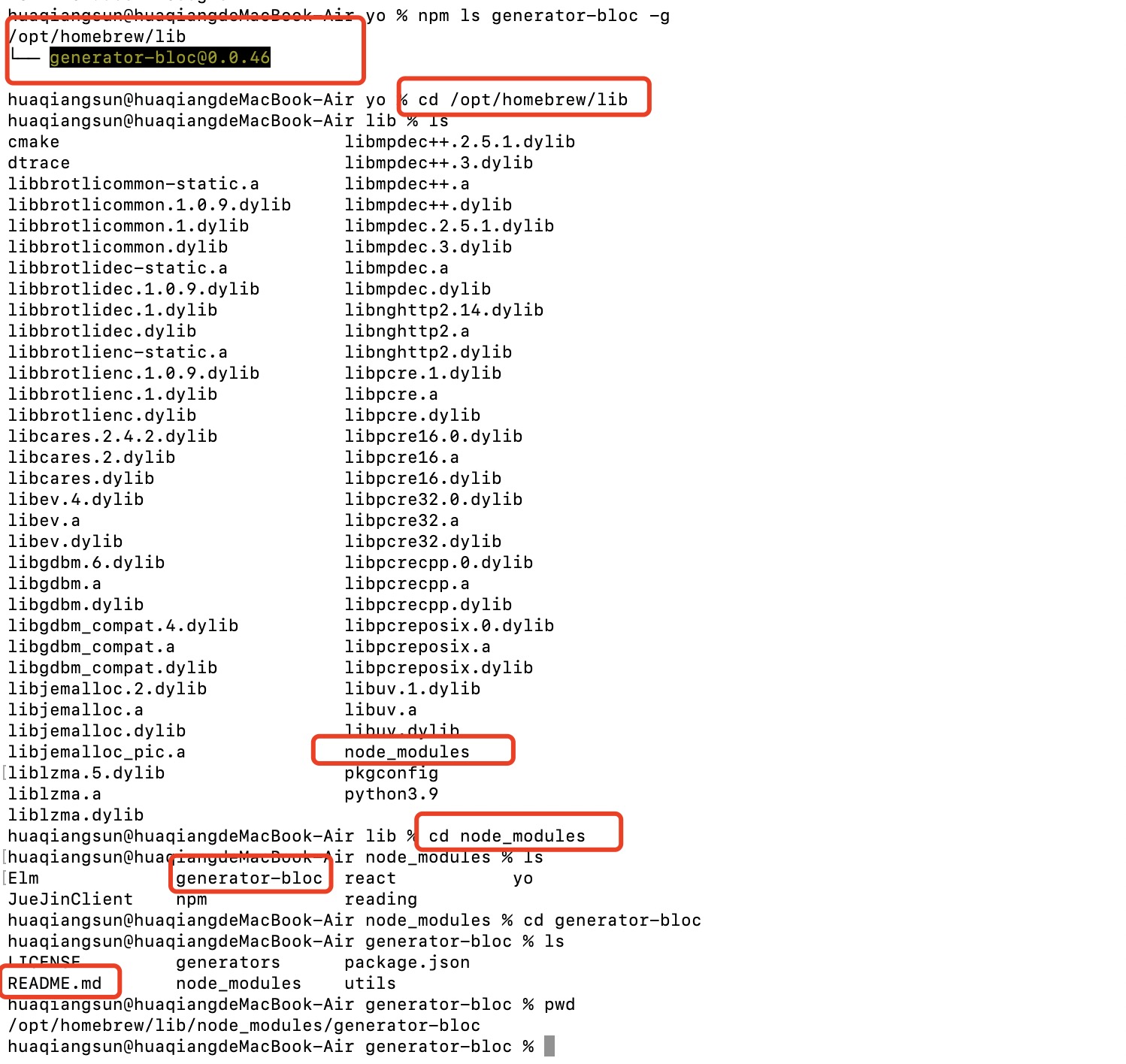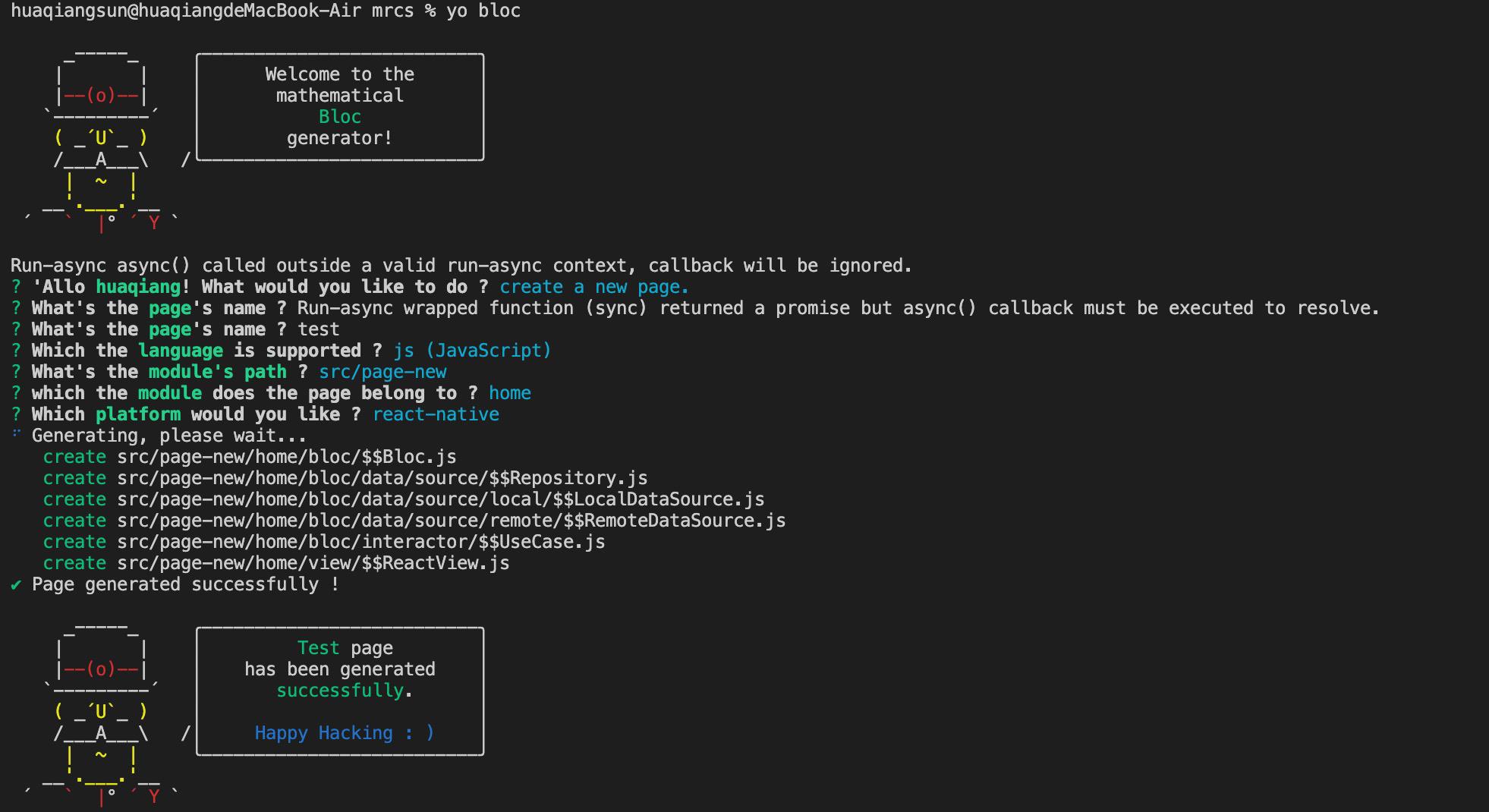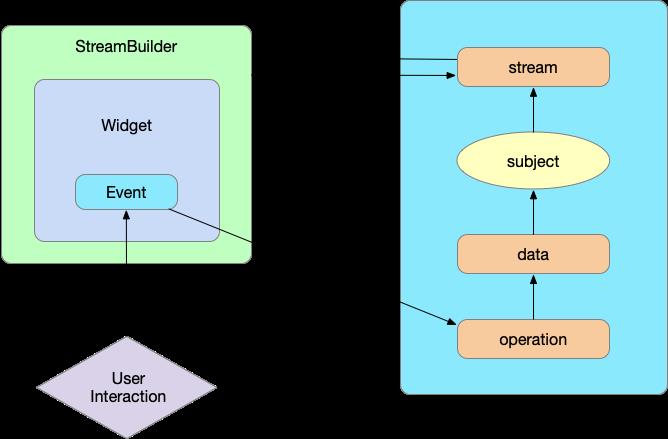ReactNative进阶(三十五):应用脚手架Yo构建RN页面
Posted No Silver Bullet
tags:
篇首语:本文由小常识网(cha138.com)小编为大家整理,主要介绍了ReactNative进阶(三十五):应用脚手架Yo构建RN页面相关的知识,希望对你有一定的参考价值。
一、前言
前期将脚手架yo安装成功,本篇博文主要讲解如何利用yo提供的代码自动生成功能生成项目代码,话不多说,开干!
二、Bloc数据流讲解
Bloc数据流工具安装:
sudo npm install -g yo
sudo npm install -g generator-bloc
安装完成后通过执行 npm ls generator-bloc -g 命令,查看bloc模板生成位置。执行结果如下:

进入node_modules目录,可看到生成的generator-bloc文件夹,进入该文件夹,查看README.md文件。
文件内容如下:
> # generator-bloc [![NPM version][npm-image]][npm-url] [![Build Status][travis-image]][travis-url] [![Dependency
> Status][daviddm-image]][daviddm-url] [![Coverage
> percentage][coveralls-image]][coveralls-url]
> > react-bloc cli
>
> ## Installation
>
> First, install [Yeoman](http://yeoman.io) and generator-bloc using
> [npm](https://www.npmjs.com/) (we assume you have pre-installed
> [node.js](https://nodejs.org/)).
>
> ```bash npm install -g yo npm install -g generator-bloc ```
>
> Then generate your new project:
>
> ```bash yo bloc ```
>
> ## Getting To Know Yeoman
>
> * Yeoman has a heart of gold.
> * Yeoman is a person with feelings and opinions, but is very easy to work with.
> * Yeoman can be too opinionated at times but is easily convinced not to be.
> * Feel free to [learn more about Yeoman](http://yeoman.io/).
>
> ## License
>
> MIT © [MeePwn](https://github.com/maybewaityou)
>
>
> [npm-image]: https://badge.fury.io/js/generator-bloc.svg [npm-url]:
> https://npmjs.org/package/generator-bloc [travis-image]:
> https://travis-ci.org/maybewaityou/generator-bloc.svg?branch=master
> [travis-url]: https://travis-ci.org/maybewaityou/generator-bloc
> [daviddm-image]:
> https://david-dm.org/maybewaityou/generator-bloc.svg?theme=shields.io
> [daviddm-url]: https://david-dm.org/maybewaityou/generator-bloc
> [coveralls-image]:
> https://coveralls.io/repos/maybewaityou/generator-bloc/badge.svg
> [coveralls-url]: https://coveralls.io/r/maybewaityou/generator-bloc
三、利用代码自动生成功能创建新页面
此处以新建test界面为例介绍使用bloc创建界面的方法步骤,页面新建在项目中page-new目录下。
- 进入项目根目录输入命令:
yo bloc回车; - 弹出选择界面后使用上下移动键选择:
create a new page. 回车; - 输入页面名字:test 回车;
- 选择语言:
js回车; - 输入模块路径:
src/page-new回车; - 选择新建页面所在的模块:
home回车; - 选择平台:
react-native回车; - 待页面创建完成,未报错则说明页面创建成功;

通过以上步骤信息结合项目结构可知,
-
脚手架yo为我们新生成了
home/view/TestView.js、 home/bloc/TestBloc.js、home/bloc/interactor/TestUserCase.js、home/bloc/data/source/TestRepository.js、home/bloc/data/source/local/TestLocalDataSource.js、home/bloc/data/source/remote/TestRemoteDataSource.js等文件。 -
在
home/bloc/ioc/types.js文件中新增bloc标识:
TestBloc: Symbol.for('TestBloc'), -
在
bloc/ioc/register.js文件中新增容器配置:
import TestBloc from '../TestBloc';
container.bind(BLOC_TYPES.TestBloc).to(TestBloc);
- 在
home/route-config/HomeRouteConfig.js将新建页面添加到路由中;
将TestView添加到export中即可使用router.navigate(“TestView”)跳转到该页面。
注:本项目路由使用router:import { router } from 'mario-navigation-extension';
四、Bloc数据流使用说明

bloc数据流采用stream-builder的形式绑定数据,当stream绑定的数据有改变时,builder便会重新渲染界面,类似于RN的setState,下面以刚创建的TestBlocView为例介绍使用步骤:
- 首先,该页面的入口文件为
src/page-new/view/TestView.js, 该界面只写view相关的代码,export default ( ) ...方法即为页面入口,该方法可接收路由传递的参数,可在此方法完成参数初始化,如果该页面需要在未被销毁的情形下多次加载,可以使用try catch初始化,container.get(BLOC_TYPES.TestBloc)方法会完成bloc的唯一注册,只会在第一次初始化时渲染界面,重新渲染需要使用BlocProvider.of(BLOC_TYPES.TestBloc),因此多次加载同一界面可以使用如下代码:
export default (props) => {
let _bloc = null;
try {
_bloc = BlocProvider.of(BLOC_TYPES.TestBloc);
} catch (error) {
_bloc = container.get(BLOC_TYPES.TestBloc);
}
const params = props.navigation.state.params;
_bloc.init(params);
return <BlocProvider bloc={_bloc} child={_viewBuilder} />;
};
其中init方法在TestBloc中定义。
- 接下来便是
_viewBuilder中的界面UI:
function _viewBuilder() {
const _bloc = BlocProvider.of(BLOC_TYPES.TestBloc);
return (
<View style={style.container}>
<StreamBuilder stream={_bloc.viewState$} builder={_testBuilder} />
<StreamBuilder stream={_bloc.listData$} builder={_listBuilder} />
</View>
);
}
其中stream为TestBloc中定义的数据,builder为界面UI,builder会获取绑定数据的快照snapshot,snapshot.data即为绑定的数据。
function _testBuilder(snapshot){
if(snapshot.hasData){
return (
<Text>{JSON.stringify(snapshot.data)}</Text>
)
} else
return (
<View></View>
)
}
stream可以绑定多个数据流:
<StreamBuilder stream={_bloc.listData$.pipe(combineLatest(_bloc.searchObj$))} builder={_userListBuilder} />
- 页面数据定义在
src/page-new/home/bloc/TestBloc.js中,
listData = {
viewState: {
isRefresh: false,
isLoading: true,
hasMore: true,
hint: '加载中...',
pageNo: '1',
pageSize: '15',
},
list: [],
data: {},
};
listData$ = new EnhanceSubject(this.listData);
viewState = {
open: false,
pickerItems: [{ text: '待发货', handleFlag: '1' }, { text: '已发货', handleFlag: '2' }],
pickedItem: {
text: '待发货',
handleFlag: '1',
},
totalSize: 0,
};
viewState$ = new EnhanceSubject(this.viewState);
listData$即为TestView例绑定的数据,当listData$改变时界面就会重新渲染,例如:
init = (params) => {
this.listData= processModify(this.listData, {
viewState: {
isRefresh: params.isRefresh,
isLoading: params.isLoading,
hint: '加载中...'
},
});
this.listData$.add(this.listData); // 相当于RN的setState
};
!注:定义在TestBloc中的方法建议使用箭头函数,防止
this指向跑偏。
- 网络请求使用封装好的WebService:
src/main/service/WebService.js,WebService的BaseUrl为:src/main/constant/Constant.js:BASE_URL,请求参数有个meta数据,该meta数据会在真正请求前删除,使用meta: { silence: true }可以在请求时不展示Loading框,默认会加载Loading框
在bloc中定义异步接口方法,
queryList = async (refresh, handleFlag) => {
let index = refresh ? '1' : this.listData.viewState.pageNo;
this.listData = processModify(this.listData, {
viewState: {
...this.listData.viewState,
isRefresh: refresh,
isLoading: !refresh,
hint: '加载中...'
},
});
this.listData$.add(this.listData); // 发起请求时刷新界面状态
// 使用userCase调用接口,返回的是两个对象,第一个为接口报错(非业务逻辑错)时的对象,第二个为接口正常返回的对象
const [error, data] = await this.useCase.execute({
bizline: '4',
tasktyp: '25',
handleFlag: handleFlag || this.viewState.pickedItem.handleFlag,
pageNo: index,
pageSize: this.listData.viewState.pageSize,
meta: { silence: true },
});
if (error) {
...
this.listData$.add(this.listData); // 接口报错时更新界面UI
return;
}
let hasList = this.listData.list || [];
if (refresh) {
hasList = [];
}
let list = data.resultList;
let isMore = list.length >= parseInt(this.listData.viewState.pageSize);
let hint = '';
if (hasList.length < 1 && list.length < 1) {
hint = '抱歉~没有相关信息';
}
this.listData = processModify(this.listData, {
list: hasList.concat(list),
data,
viewState: {
...this.listData.viewState,
isRefresh: false,
isLoading: false,
hasMore: isMore,
pageNo: `${parseInt(index) + 1}`,
hint: hint || (isMore ? '加载更多' : '没有更多了'),
}
});
this.listData$.add(this.listData); // 请求得到后台数据后刷新界面数据
this.viewState = processModify(this.viewState, {
totalSize: data.totalSize,
});
this.viewState$.add(this.viewState); // 刷新界面状态
};
添加:
buildUseCasePromise(params) {
return this.repository.queryList(params);
}
添加接口参数,也就是this.useCase.execute传过来的参数,userCase的excute方法执行的是buildUseCasePromise方法,如果是其它方法需要自定义:
handleCheck(params) {
return to(this.repository.handleCheck(params));
}
此时需要将结果用to包裹,以规范返回数据的格式:
import { to } from '../../../../main/utilities';
调用自定义方法时,需要将bloc里的调用方法由this.useCase.execute({})改为this.useCase.handleCheck({});
然后定义数据流策略,使用远程服务器数据还是本地数据库数据(定义在src/page-new/home/bloc/data/source/TestRepository.js:):
queryList(params) {
return this.remoteDataSource.queryList(params);
}
在该处可以进行数据的并行或者串行请求或者数据的其它一些处理:
async queryList(params) {
const data = await this.remoteDataSource.queryList({ meta: { silence: true } });
if (data.list.length > 0) {
let customeridStr = '';
data.list.forEach((item) => {
customeridStr += item.customerid + ',';
});
// 串行接口
const signalData = await this.remoteDataSource.queryNewsTheme(
{ customeridStr, flag: 'index', ...params, meta: { silence: true } });
let listIndex = []
for (let i = 0; i < signalData.listIndex.length; i++) {
...
}
return { totalSize: signalData.totalSize, listIndex };
} else {
return { 'listIndex': [] }
}
}
最后就是调用webService请求后台接口:
queryList(params) {
return this.webService.request(queryTaskPageList, params);
}
其中params是传过来的,queryTaskPageList为接口名称,需要自定义:
const queryTaskPageList = 'queryTaskPageList';
拓展阅读
以上是关于ReactNative进阶(三十五):应用脚手架Yo构建RN页面的主要内容,如果未能解决你的问题,请参考以下文章
ReactNative进阶(三十四):npm Error: Cannot find module ‘are-we-there-yet‘解决措施
ReactNative进阶(三十七):应用SectionList实现分组列表
跨平台应用开发进阶(三十五) :Android权限列表permission说明
ReactNative进阶(三十一): IoC 框架 InversifyJS解读